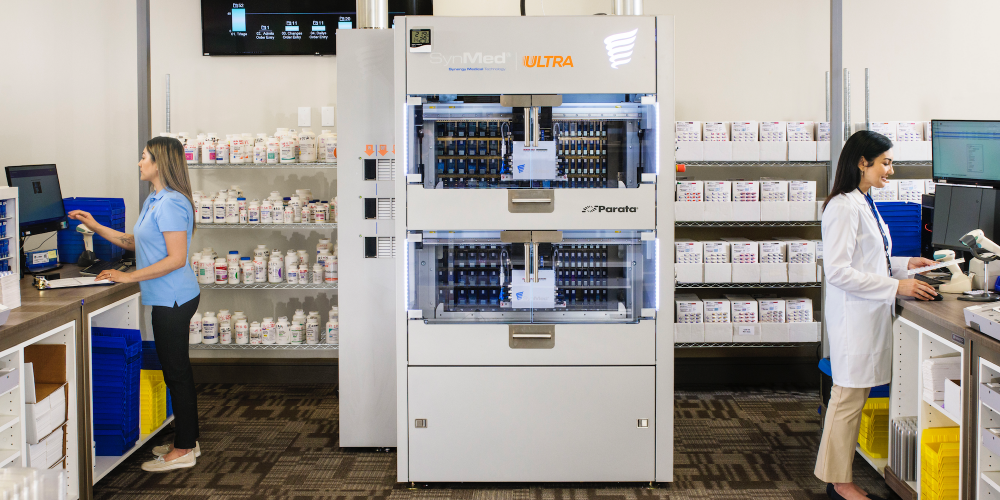Managing Costs and Improving Outcomes: The Distinct Role of LTC Pharmacies
Across a diverse range of care settings, LTC pharmacies play a pivotal role in ensuring individuals with complex health care needs receive appropriate medications and care. The specialized services provided by LTC pharmacies are crucial for maintaining the health and well-being of residents in communities such as skilled nursing, assisted living, behavioral health, and intellectual and developmental disability service providers. In this blog post, we explore the unique aspects of LTC pharmacy services, how they differ from traditional retail and mail order pharmacies, and the various benefits they offer to residents, their families, and the community at large.
The Role of LTC Pharmacies in Long-Term Care Settings
Long-term care and other communal living settings, such as nursing homes, assisted living facilities, behavioral health centers, and other residential care communities, cater to individuals with chronic illnesses, disabilities, or advanced age who require ongoing support with activities of daily living. In these settings, LTC pharmacies serve as integral partners in managing residents’ medication needs efficiently and effectively.
Unlike traditional retail or community pharmacies, LTC pharmacies specialize in serving the needs of long-term care communities and organizations. While mail-order pharmacies cater to patients receiving medications via mail, LTC pharmacies provide on-site services tailored to the unique needs of long-term care facilities. This includes emergency support and comprehensive medication management.
By understanding the scope and benefits of LTC pharmacy services, residents, their families, and community staff can make informed decisions regarding the care of their loved ones and enhance the quality of life within long-term care communities.
What are LTC Pharmacy Services?
LTC pharmacy services encompass a wide range of pharmacist-driven care tailored to meet the individual needs of residents in LTC settings. The Centers for Medicare and Medicaid Services (CMS) outline the services that LTC pharmacies are required to provide to the residents and communities they serve. These services extend beyond merely dispensing medications to include medication management, consulting, and education. They offer specialized packaging, delivery, and consulting services tailored specifically to long-term care settings.
“From inventory requirements to packaging and billing services, these specialized pharmacies are required to provide a wide range of services more comprehensive and effective than traditional retail or mail-order pharmacies,” explains Chris Crisafulli, Vice President of PBM and Network Operations for Guardian Pharmacy Services.
One of the distinguishing features of the services provided by LTC pharmacies is their customization for each community. They work closely with facility staff to develop personalized medication regimens that align with residents’ medical conditions, preferences, and treatment goals.
Benefits of LTC Pharmacy Services
Experienced Senior Care Pharmacists
LTC pharmacies employ pharmacists with specialized training and expertise in senior care. These professionals play a crucial role in promoting resident safety and well-being through optimizing medication therapy, ensuring appropriate drug monitoring, and preventing adverse drug events.
24/7 Pharmacy Service
With round-the-clock availability and emergency services, LTC pharmacies ensure residents have continuous access to medications, even outside regular business hours.
Regulatory Support
In this tightly regulated sector of health care, LTC pharmacies are essential allies, aiding providers in navigating and adhering to complex compliance standards. They offer critical support during state surveys, helping to ensure compliance with regulatory standards including facility accountability of controlled substances and optimizing medication management best practices.
Assistance with Benefit Plans
LTC pharmacies and their experienced billing teams can assist residents and their families in navigating the complex world of Medicare plans. They play a critical role during the Medicare Annual Enrollment Period, advising on plan selection, optimizing coverage, and reducing out-of-pocket medication costs.
“Many residents who transition into long-term care experience a life event that qualifies them for a Special Enrollment Period,” explains Crisafulli. “These Special Enrollment Periods allow residents the opportunity to select a new benefit plan that better meets their current needs based on their current medication regimen and new living setting.”
Smart Packaging Technology
Utilizing advanced packaging solutions, LTC pharmacies enhance medication safety by reducing the risk of medication errors during administration. Packaging is consistently labeled, sorted by administration date and time, and barcode-enabled, ensuring the right medication is administered to the right resident, at the right time.
Real-Time Pharmacy Connection
LTC pharmacies can connect, in real time, with the electronic medication administration record system in the community. Through this integrated technology, LTC pharmacies provide oversight of medication management, enabling timely intervention and coordination of care to improve safety and outcomes.
Quality Reviews
LTC pharmacies employ experienced nurses and pharmacists who can perform quality assurance audits and identify opportunities for improvement in medication management practices. From inspecting for proper medication storage and controlled substance handling to evaluating safe medication administration practices, these services lead to enhanced safety, efficiency, and resident satisfaction.
Community Staff Education
LTC pharmacy teams offer training and education for community staff on safe medication practices, promoting adherence to medication protocols and minimizing risks associated with medication administration. These educational opportunities can be tailored to meet the community’s needs. From fall prevention to dementia care and even CPR courses, LTC pharmacies can offer a wide range of online and in-person education to ensure community staff is confident in their approach to care.
A Focus on Outcomes
LTC pharmacies commit to the well-being of residents in various ways, going beyond merely dispensing medications. Their commitment extends to optimizing medication therapy, promoting adherence to prescribed medication therapies, ensuring medication regimens are aligned with insurance plan formularies, preventing adverse drug events, reducing hospital admissions, and enhancing overall health outcomes.
Emergency Evacuation Planning
LTC pharmacies collaborate with facilities to develop comprehensive emergency preparedness plans, ensuring uninterrupted access to medications and continuity of care during crises, such as a natural disaster or forced evacuations.
It’s through this suite of valuable services that LTC pharmacies contribute to the health and well-being of residents in long-term care settings.
“By providing tailored pharmacist-driven care, leveraging advanced technology, and prioritizing safety and quality, these specialized pharmacies contribute significantly to enhancing the overall quality of life for residents, reducing health care costs, and fostering a culture of wellness within long-term care communities,” Crisafulli adds.
For more information about the benefits of an LTC pharmacy, download our fact sheet.

Chris Chrisafulli, Vice President, PBM Network Operations
A University of Connecticut graduate with a Master of Business Administration from Bryant University, Chris leads pharmacy network strategy for Guardian Pharmacy Services, including contract negotiation, direct PBM relationships, network performance and management of the PSAO relationship. He also oversees the compliance, licensing and credentialing functions. Prior to joining Guardian, Chris spent 18 years in payer relations, contracting, planning and analysis related to Retail/LTC pharmacy reimbursement and served as the pharmacy and MinuteClinic divisions A/R department head.








